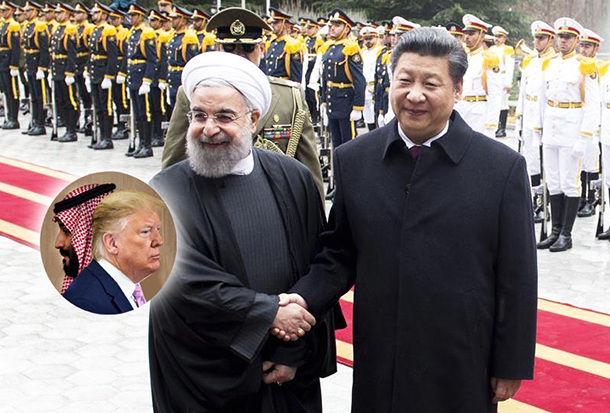
In the wake of the Saudi Aramco Attack, and even before any data or evidence had been gathered, US President Donald Trump and his bellicose Secretary of State Mike Pompeo immediately blamed Iran, going so far as to call it “an act of war” against Saudi Arabia and the “international economy,” and have announced this morning that they will be deploying additional US troops and hardware to Saudi. All of this despite the fact that the Yemeni ‘Houthi’ Resistance forces had already announced publicly that they had launched the drone attacks. Besides the problem of apportioning blame, there is another fundamental flaw in this reckless US-Saudi approach to escalating tensions in the region. In a word: China.
In response to multiple US threats of war, Iranian foreign minister Javad Zarif, has warned the US-Saudi axis of “all-out war” should the US or Saudi Arabia decide to strike Iran militarily. Zarif vowed to fight US-Saudi “to the last American soldier.” There can be no doubt as to the weight of this statement. Iran has stated that it hopes to avoid any conflict, is willing to engage in diplomatic talks with its neighbors Saudi Arabia and the United Arab Emirates (UAE), but has explicitly stated that it will not hold talks with Washington unless punitive economic sanctions are lifted by the US in accordance to the 2015 JCPOA Iran Nuclear Agreement.
There is another big elephant in the room, or a dragon, to be more precise. As it turns out, China has already pledged some $280 billion of investment into modernizing Iran’s struggling oil, gas and petrochemicals sectors, along with another $120 billion invested to help upgrade Iran’s transport and manufacturing infrastructure. That’s a total of $400 billion which Beijing has allocated to prepare Iran to be the key Eurasian hub for its new Belt and Road Initiative. In return for this investment, Chinese companies have asked for ‘first refusal’ on the country’s future oil and gas projects, including its massive South Pars gas field, geographically shared with Qatar. Astute geopolitical analysts already know this macro-is the economic nub of the issue, and that is why the US has been so keen to isolate and cripple the country of Iran.
If the US-led axis, with encouragement from Israel, continues on the war trajectory, then threats of major economic retaliation by China (like dumping US Treasuries onto the global market, for instance) should be expected. Either way, this would be an astronomical gamble by the United States, but not completely out of the question if one of Washington’s long-range geostrategic objectives is to eventually force China into a global conflagration.
Forbes reports…
Amidst historic U.S. – Iran tensions, Beijing is doubling-down on its strategic partnership with Tehran, ignoring U.S. efforts to isolate the Islamic Republic from global markets. Following an August visit by Iran Foreign Minister Mohammad Javad Zarif to Beijing, the two countries agreed to update a 25-year program signed in 2016, to include an unprecedented $400 billion of investment in the Iranian economy – sanctions be damned.
The capital injection, which would focus on Iran’s oil and gas sector, would also be distributed across the country’s transportation and manufacturing infrastructure. In return, Chinese firms will maintain the right of the first refusal to participate in any and all petrochemical projects in Iran, including the provision of technology, systems, process ingredients and personnel required to complete such projects. According to an exclusive interview with Petroleum Economist, a senior source in Iran’s petrochemical sector had this to say about the new agreement:
The central pillar of the new deal is that China will invest $280 billion developing Iran’s oil, gas and petrochemicals sectors… there will be another $120 billion investment in upgrading Iran’s transport and manufacturing infrastructure, which again can be front-loaded into the first five-year period and added to in each subsequent period should both parties agree.
This comes at a time when Washington is exerting its so-called ‘maximum pressure’ strategy against Iran, which aims to change its international behavior by bringing oil exports down to zero…
READ MORE IRAN NEWS AT: 21st Century Wire Iran Files
SUPPORT OUR MEDIA PLATFORM – BECOME A MEMBER @21WIRE.TV















